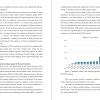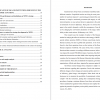Тема: The Impact of Institutions and ESG-Performance for Strategy of Multinational Enterprises in The Sanctioned Market
Закажите новую по вашим требованиям
Представленный материал является образцом учебного исследования, примером структуры и содержания учебного исследования по заявленной теме. Размещён исключительно в информационных и ознакомительных целях.
Workspay.ru оказывает информационные услуги по сбору, обработке и структурированию материалов в соответствии с требованиями заказчика.
Размещение материала не означает публикацию произведения впервые и не предполагает передачу исключительных авторских прав третьим лицам.
Материал не предназначен для дословной сдачи в образовательные организации и требует самостоятельной переработки с соблюдением законодательства Российской Федерации об авторском праве и принципов академической добросовестности.
Авторские права на исходные материалы принадлежат их законным правообладателям. В случае возникновения вопросов, связанных с размещённым материалом, просим направить обращение через форму обратной связи.
📋 Содержание
1.1 Influence of ESG-performance and institutions on MNE’s strategy 10
1.1.1 The ESG concept 10
1.1.2 Institution-based view and sanctions 14
1.1.3 Home-country institutions 15
1.1.4 Host-country institutions 16
1.1.5 National and supranational institutions 17
1.1.6 Formal and informal institutions 18
1.2 Economic sanctions as a context for strategy-development by MNE’s 20
1.2.1 The definition and types of sanctions 20
1.2.2 Specifics of economic sanctions against the Russian Federation 21
1.2.3 Counter sanctions of the Russian Federation 23
1.2.4 ESG performance of the company and its strategic decision in the sanctioned
market 25
1.2.5 Impact of home-country formal and informal institutions in the context of sanctions 27
CHAPTER 2. EMPIRICAL ANALYSIS 31
2.1 Data description 31
2.2 Variables and measures 32
2.3 Descriptive statistics and sample analysis 34
2.4 Difference on means analysis 36
2.5. Ordinal regression analysis results 39
CHAPTER 3. DISCUSSION OF THE RESULTS 43
3.1 Theoretical and practical implementation 43
3.2 Limitations and further research 45
CONCLUSION 47
References: 48
📖 Введение
This research uses the example of market of the Russian Federation as sanctioned market for studying the effect of sanctions on the strategy of MNE’s there. The start of Russian special military operation (SMO) in Ukraine caused deep structural changes not only in the Russian economy, but also in global trade operations. A lot of international companies were forced to shut their operations down on the territory of the Russian Federation, as well as Russian companies worldwide. The cause of this, first, is sanctions imposed bilaterally from Russia and other countries. According to different resources, before the start of the SMO Russia was imposed by around 2700 different types of sanctions, but after the start of the conflict, their number has increased to more than 16000. After imposing each package of sanctions by foreign countries, the Government of the Russian Federation takes retaliatory measures, also known as counter sanctions. Thus, there are hundreds of companies, governmental and non-governmental organizations, officials and others, impacted by measures against them.
All of these external changes force companies to adapt to existing situations and make crucial decisions regarding their operations. Faced with sanctions, companies start to make different changes in their strategy and corporate politics and try to find best solutions in terms of efficiency, global image, risk-mitigation. When faced with the possibility of sanctions, businesses try to minimize the possibility of unintentional violations. As a result, they "over comply" with the restrictions, putting their counterparties through extensive due diligence procedures, keeping a minimum distance from them, and restricting their operations beyond what is mandated by regulatory bodies. Businesses also employ this tactic to protect themselves against the potential of regulatory action quickly enacted in the event that geopolitical conflicts worsen. (Ya, 2023).
It cannot be said that economic sanctions aim only for economic purposes. Mainly, they are oriented on behavioral changes for economic agents. At the same time, sanctions have an impact not only on the targeted country, but also on the sender country itself. The reason for this is the desire to restrict the activity of domestic companies in the targeted country.
On the business point of view, it is not appropriate to wait when sanctions will be imposed - initially international companies should monitor their external environment and take preventive measures. According to Meyer et al. (2023) this risk-management should include such procedures as evasive actions, restructuring of operations and pre-emptive corporate political activity. Companies might reorganize their global operations by moving their headquarters, changing the geographic coverage of their supply chains, selling off assets, or giving subsidiaries more autonomy. Therefore, for instance, suppliers in countries where instability in politics may arise may be replaced by suppliers in friendly countries or in the supplier's own nation—a practice that has been called "friend-shoring". (Hsu et al, 2022).
Working in the sanctioned market is a big concern for the companies in terms of reputation and legitimacy. Companies try to balance between saving their reputation in the eyes of society and losing existing profits and business infrastructure in the sanctioned market. One of the key factors that defines legitimacy of the company is sustainability of its operations and corporate reporting transparency. The advantages of including sustainability into business strategy and operations and improving reporting on sustainability, according to researchers, are increased transparency, increased brand value, improved reputation and legitimacy, raised employee and customer loyalty, lower costs, better business practices, improved firm performance and valuation, and the creation of competitive advantage. (Sanchez-Planelles et al., 2020).
One of the ways to monitor companies’ sustainability strategies which leads to relations improvement with key stakeholders is ESG-performance. ESG scores of companies show whether they are successful in adopting and involving in their business operations sustainable practices in environment, social and governance aspects. This study strives to investigate the importance of this factor in strategic decision making by multinational enterprises operating in sanctioned markets in the example of the Russian Federation, considering ESG-performance of companies as one of the factors, which could affect on making strategic decisions concerning continuing operations in the market under economic sanctions.
✅ Заключение
Following research questions were solved during the study:
1) What is the interrelation between the ESG-performance of the company and its willingness to withdraw from the sanctioned market?
2) What is the impact of informal home-institutions on companies’ strategy in the market under economic sanctions?
3) What is the impact of formal home-institutions on companies’ strategy in the market under economic sanctions?
After reviewing literature on such topics as ESG-concept, institution-based view and sanctions there were provided quantitative analysis of companies which were operating in the Russian Federation before and after imposition of sanctions. Final sample included 607 companies, which changed their strategy in the sanctioned market or continue business as usual in it.
Quantitative analysis showed that ESG-performance informal and formal home country-institutions of MNE’s have significant impact on strategic decision making in the sanctioned market. ESG-performance impacts on the MNE’s reduce of operations in a negative way, as well as informal institutions proxied by Power distance index. In contrast, formal institutions proxied by Rule of law index showed positive influence on companies’ strategic choice to withdraw from the market under sanctions.
This study filled the gap in the lack of academic literature explaining the role and influence of ESG-scores of companies and informal and formal institutional specifics of their home-countries. Practical implementation of the study is useful for different economic agents, such as companies, governments, authorities etc.





